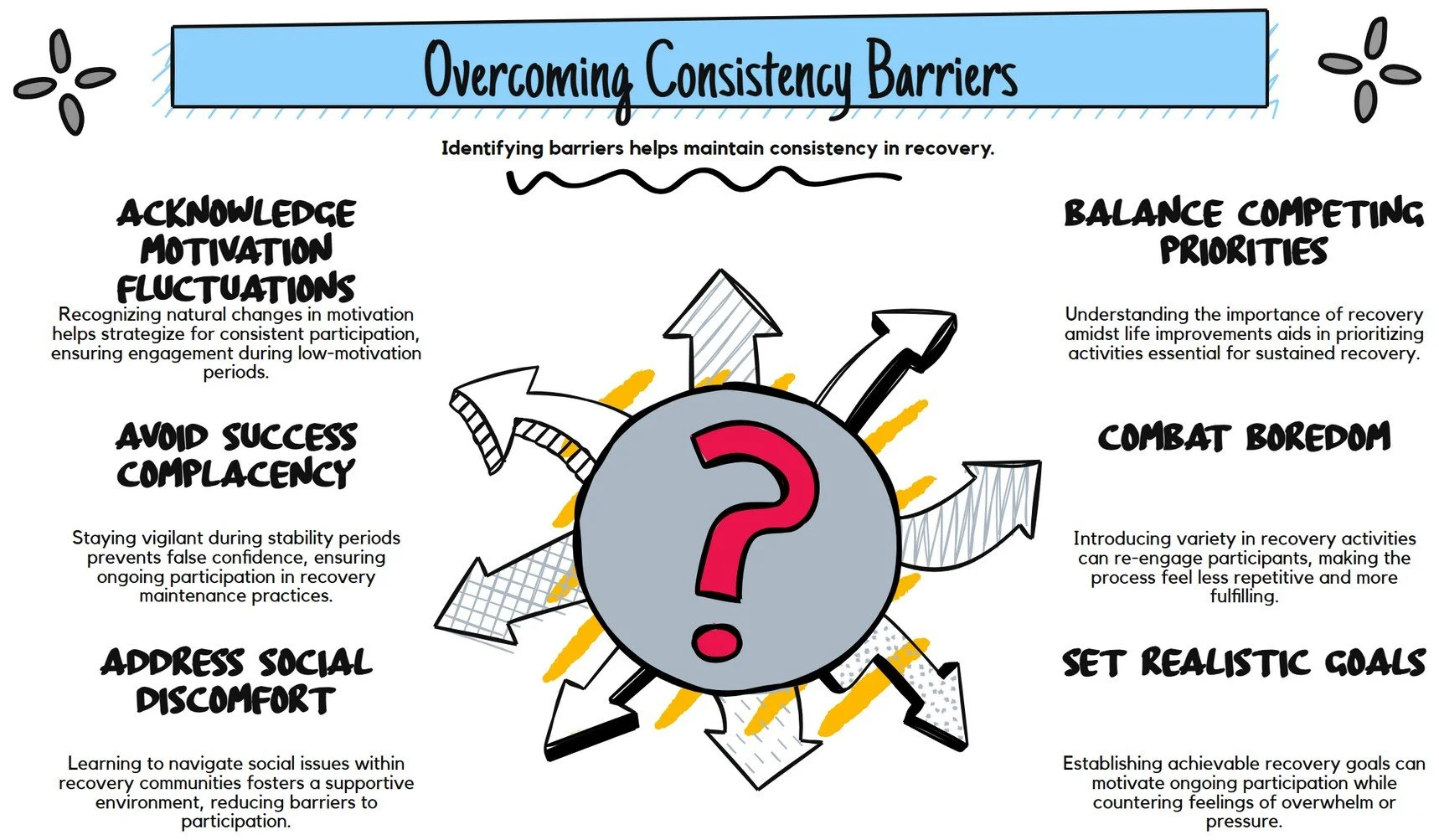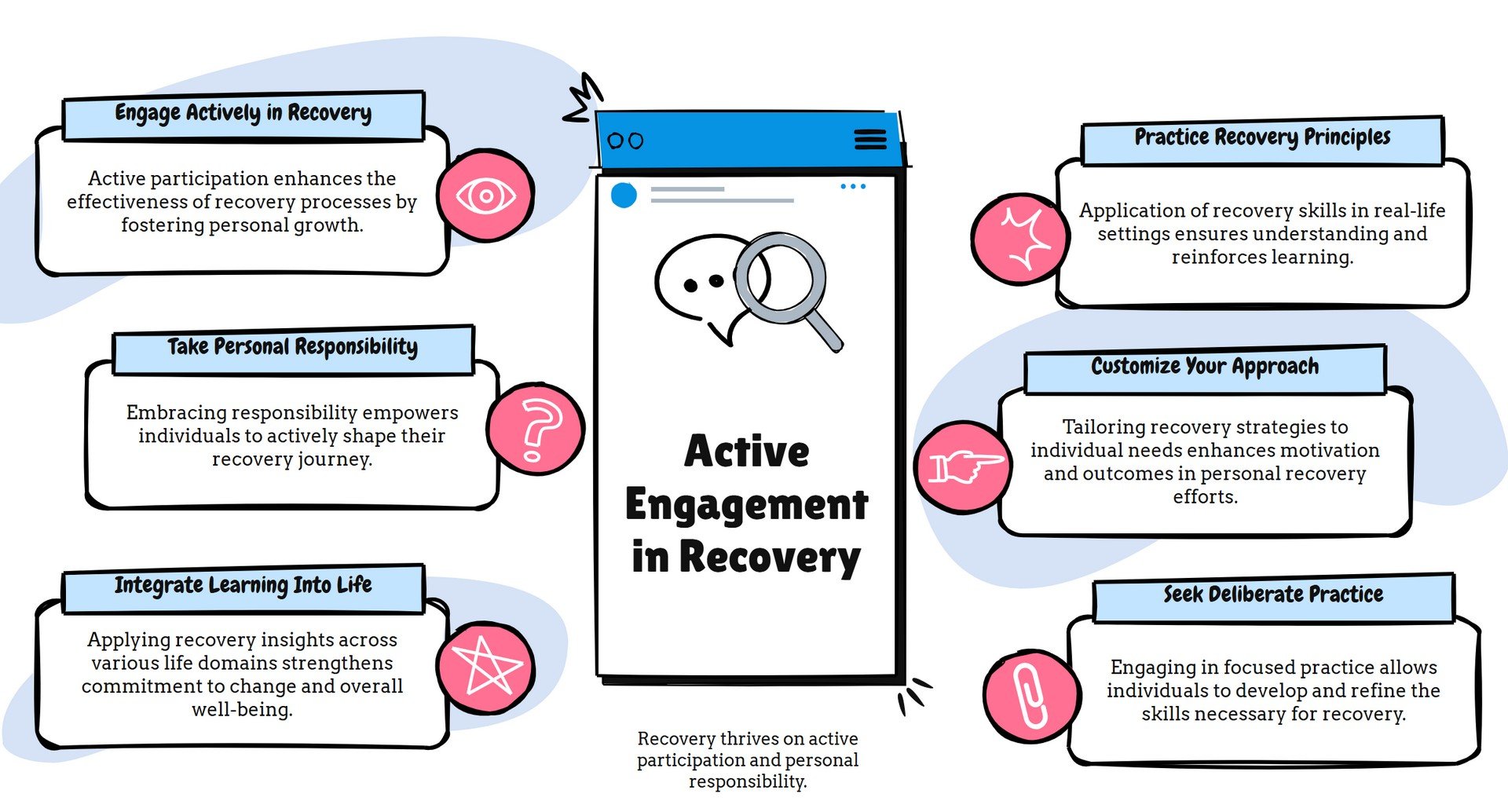
“Keep Coming Back”
The AA saying "keep coming back, it works if you work it" encapsulates two fundamental truths about successful recovery: the importance of consistent participation and the necessity of active engagement. This deceptively simple phrase addresses both the persistence required for recovery success and the reality that recovery is not a passive process—it requires deliberate, ongoing effort and commitment.
This self-assessment is designed to help you examine your relationship with both aspects of this crucial recovery principle. It explores your patterns of consistency in recovery participation, identifies areas where you might be engaging passively rather than actively, and helps you develop stronger commitment to both showing up regularly and working your recovery program with genuine effort and engagement.
Why Consistency Matters in Recovery
Neuroplasticity and Habit Formation: Recovery requires rewiring deeply ingrained neural pathways associated with addictive behaviors. Consistent exposure to recovery principles and practices strengthens new neural connections while weakening old addiction patterns. Inconsistent participation slows this essential neurological healing process.
Community Integration and Support: Recovery communities function through sustained relationships and mutual support. Consistent participation allows for the development of meaningful connections that provide crucial support during challenging times. Sporadic attendance prevents the formation of these protective relationships.
Skill Development and Mastery: Recovery skills require practice and repetition to become automatic responses during stress or crisis. Consistent participation provides ongoing opportunities to practice these skills in low-risk environments before needing them during high-risk situations.
Accountability and Reality-Testing: Regular participation in recovery community provides ongoing reality-testing and accountability that helps identify emerging problems before they become crises. Inconsistent participation removes this early warning system.
Spiritual and Emotional Stability: Recovery provides ongoing spiritual and emotional maintenance similar to physical fitness. Consistency maintains spiritual and emotional health while inconsistency allows gradual deterioration that may not be immediately apparent.
Common Barriers to Consistency
Motivation Fluctuations: Natural variations in motivation and enthusiasm can lead to reduced participation during low-motivation periods, precisely when consistent participation is most needed.
Competing Priorities: As life improves in recovery, other activities and responsibilities may seem more important than recovery maintenance, creating false choices between recovery and other life areas.
Success Complacency: Extended periods of stability can create false confidence that recovery maintenance is no longer necessary, leading to reduced participation when ongoing maintenance is still essential.
Boredom and Routine: Regular recovery activities may begin to feel repetitive or boring, particularly during periods when dramatic growth is not apparent, leading to reduced engagement with familiar but valuable practices.
Social Discomfort: Personality conflicts, relationship difficulties, or social anxiety within recovery community can create barriers to consistent participation that must be addressed rather than avoided.
Why Active Engagement Is Essential
Recovery as Active Process: Unlike medical treatments that work through passive consumption, recovery requires active participation, conscious choice-making, and deliberate behavior change. Passive attendance without engagement provides minimal benefit.
Skill Application vs. Knowledge Acquisition: Learning about recovery principles provides limited benefit compared to actively practicing and applying these principles in real-life situations. Knowledge without application remains theoretical and ineffective.
Personal Responsibility and Agency: Recovery requires taking active responsibility for personal growth and change rather than expecting others or external programs to create change. Active engagement develops this essential personal agency.
Customization and Personalization: Generic recovery approaches must be actively adapted and customized to individual circumstances, personality, and needs. This customization requires active engagement and experimentation rather than passive compliance.
Integration and Generalization: Recovery principles learned in recovery settings must be actively integrated into all areas of life. This integration requires deliberate practice and conscious application beyond formal recovery activities.
Common Forms of Passive Participation
Physical Attendance Without Mental Engagement: Showing up to meetings while mentally absent, distracted, or going through motions without genuine participation or absorption of content.
Listening Without Application: Hearing recovery sharing and guidance without considering personal application or taking action on insights and suggestions.
Social Participation Without Program Work: Engaging with recovery community socially while avoiding deeper program work, step completion, or challenging personal examination.
Crisis-Driven Engagement: Increasing recovery involvement only during crisis periods while reducing engagement during stable times when ongoing maintenance is equally important.
Selective Implementation: Choosing only comfortable or appealing aspects of recovery suggestions while avoiding challenging or uncomfortable elements that might be most beneficial.




